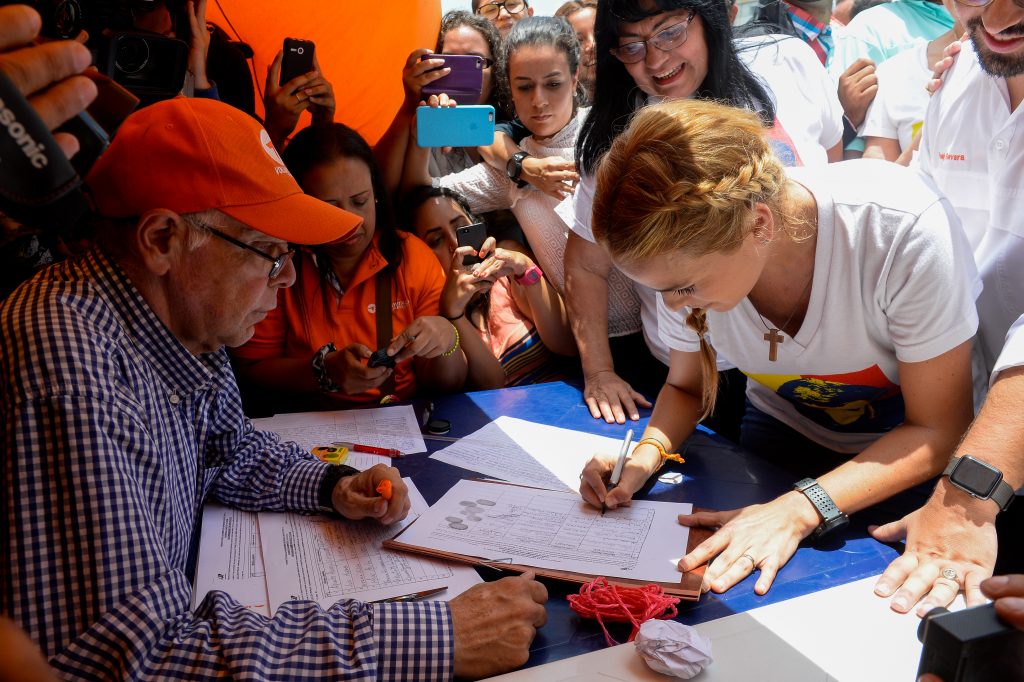
Opponents of Venezuelan President Nicolas Maduro hope to hold a referendum on removing him from office as early as November, a leading opposition figure said Wednesday. The center-right opposition has started gathering signatures to launch the first step towards a referendum to get rid of the socialist leader, whom they blame for an economic crisis and rising unrest.
/ AFP PHOTO /
by Alexander MARTINEZ
CARACAS , Venezuela (AFP) — Venezuela’s opposition tried to sack the food minister Thursday for shortages in the crisis-hit country and claimed a million people backed its call for a referendum to remove the president.
President Nicolas Maduro promptly rejected the demand, the latest offensive in the battle to replace the government over a crisis that has families queuing up for food rations.
“We are facing the worst food emergency in Venezuela’s history,” said Ismael Garcia, the lawmaker leading the motion to sack minister Rodolfo Marco Torres.
The speaker of the opposition-controlled National Assembly, Henry Ramos Allup, said the government must remove Torres from his post after two-thirds of the lawmakers present approved a no-confidence motion against him.
But Maduro retorted: “No one will remove the minister.” He vowed to pass new emergency measures to head off attempts of “sabotage” by lawmakers.
He even threatened to cut the power to the legislature, as part of widespread blackouts he has imposed to save power.
His opponents meanwhile said they had gathered more than five times the 200,000 signatures needed to begin organizing a referendum to remove Maduro.
Senior opposition leader Henrique Capriles said more than a million people had signed a petition calling for a recall referendum.
The signatures will be handed over to the National Electoral Board (CNE) early next week for verification.
Looting
The socialist president has already blocked several bills brought by the opposition by challenging them in the Supreme Court. His critics say he controls the court and the electoral authorities.
The political tension, shortages and now enforced electricity blackouts that started this week have raised fears of unrest in the South American oil state.
Looting and clashes were reported in towns including the country’s second-biggest city Maracaibo after daily power cut-offs were formally launched on Monday.
To save power the government has also slashed the workweek to two days for state employees and ordered schools to close on Fridays.
It says the El Nino weather phenomenon has dried up the country’s hydroelectric dams.
The opposition says mismanagement is also to blame for the power crisis as well as for the shortage of food and basic supplies.
“The situation is critical,” said Norvelis Contreras, a 26-year-old housewife, who had been queuing for five hours to buy rice and oil on Thursday at a supermarket in Maracaibo.
“We are suffering and trying to survive.”
In a survey published by pollster Venebarometro on Thursday, 13 percent of Venezuelans said their household only ate once a day.
Another Venebarometro poll indicated more than two thirds of Venezuelans wanted Maduro to quit.
Risk of unrest
In the no-confidence debate, opposition lawmakers said Torres had overseen corruption and ruined Venezuela’s production capacity.
Once-booming Venezuela, which has the world’s largest oil reserves, has plunged into economic chaos as global crude prices have collapsed.
Maduro blames the situation on an “economic war” against the country by capitalists. He has vowed to press on with the socialist “revolution” launched by his late predecessor Hugo Chavez in 1999.
The opposition has been pushing to drive Maduro from office since it took control of the legislature in January.
If the electoral board verifies the signatures petitioning for a referendum, the opposition will then have to collect four million more for the board to organize the vote.
It is racing to do so by the end of the year. After January, a successful recall vote would just transfer power to Maduro’s vice president rather than trigger new elections.
Analysts and politicians have warned of the risk of mass unrest in the country, already ranked by the United Nations as one of the most violent in the world.
© 1994-2016 Agence France-Presse







